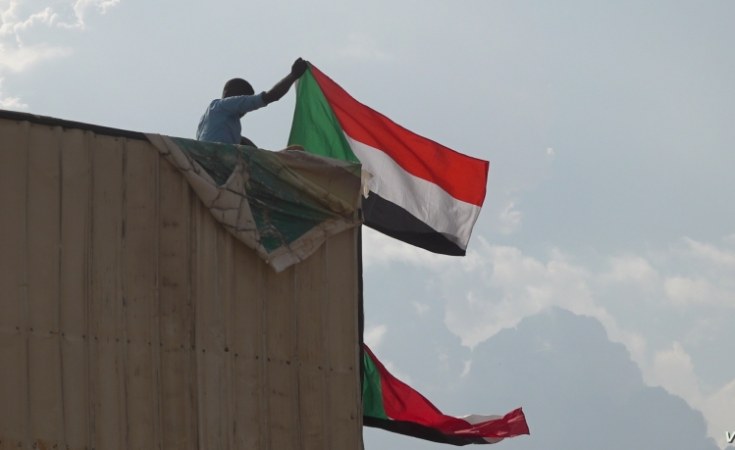Sudan's latest attempted coup has taken the world by storm this weekend. However, observers argue tensions have been brewing for a while, with the rift between its top military commanders growing. DW unpacks the crisis.
Violence returned to the streets of Khartoum and stretched beyond to other parts of Sudan as the country's two most-heavily armed forces faced off in a fight for power.
The Sudanese armed forces, under the leadership of General Abdel Fattah al-Burhan, and the powerful Rapid Support Forces (RSF) paramilitary, led by Mohamed Hamdan Daglo exchanged accusations of provoking the conflict.
With dozens killed and hundreds more injured amid ongoing fighting, the conflict has taken many outside the region by surprise.
DW attempts to break down what happened, and how we got here.
Who is Abdel Fattah al-Burhan?
The army general, who is the de facto leader of Sudan, became a household name in April 2019, after the army ousted longtime autocrat Omar al-Bashir following monthslong mass protests.
Once a close ally of Bashir and a military commander leading his criminal campaigns in Darfur, Burhan emerged on the side of change following the 2019 power shift.
He chaired the Transitional Military Council, a body set up to oversee Sudan's transition to democratic rule.
However, with the deadline for handing over power to civilian rulers looming, in October 2021 Burhan staged a coup, overthrowing civilian Prime Minister Abdalla Hamdok and upending the country's democratic transition.
Since then, Burhan has tightened his grip on the country, despite constant protests and a December 2022 framework agreement to pave the way for a civilian-led transitional government.
Who is Mohamed Hamdan Daglo, also known as Hemeti?
Daglo, who is more commonly known as Hemeti, has enjoyed a strong position of power since Bashir's rule and beyond.
Coming from a family of camel herders far from the capital, Hemeti climbed the ranks to become the leader of the notorious Janjaweed militia, which al Bashir leaned on in his crackdown on the western Darfur region in the early 2000s. The militia is accused of committing war crimes against Darfur's non-Arab rebels.
Though he lacked formal military training, he managed to carve a place for himself in Bashir's security machine. In 2013, he was given leadership of the newly formed RSF, which emerged from the Janjaweed.
Bashir often relied on the paramilitary force to quell protests and discontent leading up to his ouster. As the RSF grew stronger and bigger, many worried it was becoming more powerful than Sudan's formal security apparatuses.
In 2017, Sudan passed a law recognizing the RSF as an independent security force.
Like Burhan, Hemeti came on the winning side after Bashir's ouster. Reports of him mulling over a role as president became widespread after he became deputy head of the Transitional Military Council. The council briefly led the country until the 2021 coup.
A deadly crackdown on a Khartoum protests camp in June 2019 left over 100 dead was largely blamed on RSF forces. Yet, Hemeti's position only grew stronger.
His years of leading the RSF also saw him accumulate allies Russia as well as in the Gulf, where the paramilitary force was deployed to fight alongside the Saudi-led coalition in Yemen.
Burhan relied on the RSF forces to quell protesters following his 2021 coup. Meanwhile, the paramilitary leader disappeared from the limelight at the time, letting Burhan be the face of the coup.
Still, he was named the deputy head of Burhan's ruling Sovereignty Council, and effectively Burhan's number two.
How did we get here?
Since the military forces and civilian representatives signed the December 2022 transition deal, talks have been underway over how to bring the RSF within the Sudanese military. Analysts believe Hemeti, whose paramilitary is thought to be 100,000-man strong, does not favor such a restructuring.
In a February address, when he called the coup a "mistake," Hemeti described it as a "gateway for the return of the former regime."
The televised address came amid heightened tensions over the military restructuring, which has derailed the return to civilian rule.
A week before Hemeti's speech, Burhan said he would not tolerate the RSF operating independently, stressing the importance of merging it into the army.
Hemeti alluded to Burhan's warnings, vaguely accusing "remnants of the defunct regime" of striving to "drive a wedge" between the RSF and the army.
The signing of an agreement to name a civilian government was due earlier this month. It was, however, indefinitely postponed at the last minute.
The agreement has been called vital to allowing elections that would bring civilian leadership back to the country after years of turmoil.
On Thursday, a top army general accused the RSF of deploying forces across the country without the army's consent, warning of potential clashes in a rare televised speech.
The paramilitary force, which had deployed troops near the northern town of Merowe, some 330 kilometers (186 miles) north of Khartoum, defended the presence of its forces.
After Saturday's clashes ignited, both Hemeti and Burhan's army exchanged accusations of attempting a coup.
rmt/sms (AFP, AP, Reuters)


